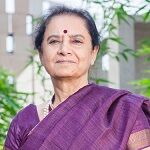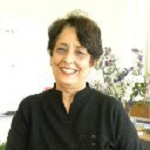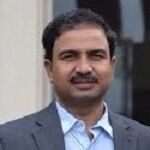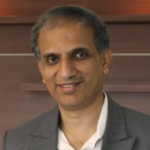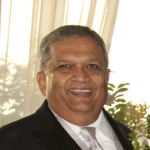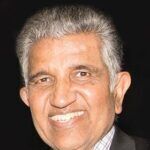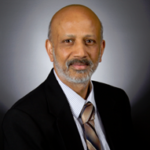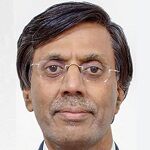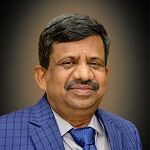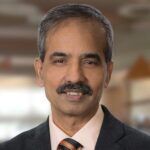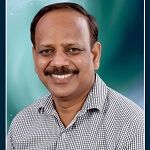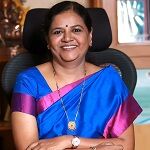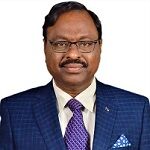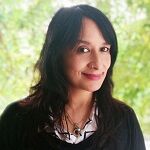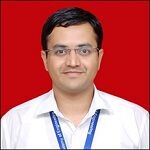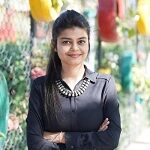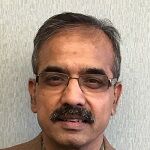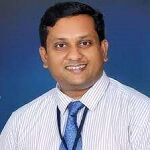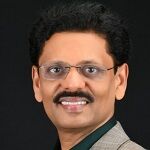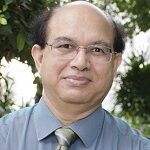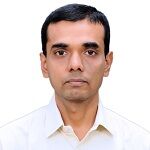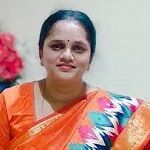ICTIEE is one of the signature programs of IUCEE connecting education experts and passionate educators all over the world for improving the potential for excellence in engineering education. It has emerged as a global platform for sharing best practices and collaborating with academic and industrial experts for both faculty and students. The research articles submitted to ICTIEE are continuously increasing every year in terms of quality and quantity. In line with the previous ICTIEE conferences, ICTIEE 2022, hosted virtually, features paper and poster presentation sessions, workshops, special lectures, panel discussions, conclaves and thus facilitating global network for the cause of effective engineering education. ICTIEE 2022 is expected to have more than 2000 delegates and is welcoming passionate educators and students to be a part of this mega event.
Institutional Sponsors

Kalasalingam Academy for Research and Education
Invited Speakers
- Dr. Indira Parekh
- Dr. S.K. Ramesh
- Dr. Uday Desai
- Mr. Dileep Chemburkar
- Dr. Veena Kumar
- Dr. Claire Komives
- Mr. Prabhakar Sunderrajan
- Mr.Niranjan Khatri
- Mr. P.B. Kotur
- Dr. Ravi Salagame
- Mr. Jayant Sathe
- Dr. Deepak Waikar
- Dr. John Tharakan
- Dr. Raj Rajaram
- Dr. S. D. Rajan
- Dr. S. Devarajan
- Dr. Karisiddappa
- Dr. Sohum Sohoni
- Dr. Prathiba Nagabhushan
- Dr. Ranji Vaidyanathan
- Mr. Vasant Marathe
Workshop Facilitators
- Prof. Vijay Jadon
- Dr. Sushma Kulkarni
- Dr. S. N. Sridhara
- Dr. Shalini Gopalakrishnan
- Dr. Richa Mishra
- Dr. Mangal Dhend
- Dr. Manoj Bhalwankar
- Dr. Neha Tuli
- Dr. Rachana Desai
- Dr. Ranji Vaidyanathan
- Dr. KG Binu
- Dr. Gopal Pingali
- Dr. Deepak Waikar
- Dr. C. Sivapragasam
- Dr. Radhika Devi
Schedule
| ICTIEE 2022 | Room 1 | Room 2 | Room 3 | |
| January 7 | ||||
| 8:00 am | Workshop 1.1 “Entrepreneurial mindset in students” Dr. Ranji Vaidyanathan, Oklahoma State U How can you continually maintain student engagement in the classroom and how can you help develop an entrepreneurial mindset in our students? There are several suggested class exercises, since they have been known to boost engagement, but it can be tricky to know which activities will amplify innovative thinking. We would like to invite selected faculty members who are working in Indian engineering colleges teaching or developing entrepreneurship courses and have them share their experiences and class exercises that they have designed to prepare student innovators at the earliest stage of their entrepreneurship journey, helping them take the first steps toward transforming their ideas into impactful inventions and ventures. The idea is that those attending this workshop can take inspiration from these innovative class exercises to help them refine their own coursework for maximum impact.
|
Workshop 1.2 “Cybersecurity” Dr. Shalini Gopalakrishnan, USA Cybersecurity is the safeguard of internet-connected systems such as data ,hardware and software from cyberthreats. Cybersecurity has been touted as the biggest threat in this decade. We are all connected for everything from education, health , jobs etc. All firms, large and small have gone through a digital transformation and cybersecurity has become even more critical for all aspects.
∙ Cloud vulnerability ∙ Data breaches ∙ IoT with 5G networks ∙ Automation and integration ∙ Targeted ransomware ∙ Cyber warfare and several others. This workshop will introduce Cybersecurity as a field and also show an interactive simulation which can be used for teaching Cybersecurity to our students. |
Workshop 1.3 “Transforming Mathematics Education in Engineering” Dr. Rachana Desai, KJSCE Objectives of Workshop:
1. To present KJSCE model of transforming Math education 2. To create experiential learning environment in mathematics 3. To inspire other institutes for the transformation 4. To motivate others to experiment with pedagogy and assessments in mathematics 5. To demonstrate adoption of technology for making math more interesting 6. To exhibit the usage of different software related to math education and their usefulness in engineering mathematics |
|
| 10:00 am | TEA BREAK | |||
| 10:30 am | Workshop 1.4 “Emotional Quotient and Emotional Balance” Dr. S.N. Sridhara, HU This workshop aims to bring awareness of the following indices among the delegates:
∙ Awareness on Emotional Quotient and methods of measuring this index using introspection questionnaire ∙ Various aspects that disturb the emotional balance and ways to suppress the emotional bursts ∙ Practicing the emotional balance in real life and career. |
Workshop 1.5 “OBE: Best Practices for Implementation” Rio D’Souza and Shreeranga Bhat, SJEC Abstract: While Outcome Based Education (OBE) has been widely implemented in most engineering programs across India, its effectiveness as a quality control mechanism remains untapped. Educators are yet to harness the power of OBE philosophy to transform student learning going beyond the documents we create to fulfil the requirements of regulators. The concept of backward design, integrating design, delivery and assessment, emphasis on assessment for learning, and using assessments as feedback loop for continuous improvement are required to be understood by the educators. This workshop focuses on these elements. Experiences of practicing OBE will be shared, along with best practices.
|
Workshop 1.6 “Mobile Robotics” Prof. Vijay Jadon, CU Mobile robotics is emerging as one of the essential applications of robotics and have been used into diverse applications ranging from medical sciences to social sciences; from automotive industry to smart houses; and from manufacturing to agriculture. The workshop is aimed to expose the participants to understand mechanics, state estimation, motion control, path planning and navigation related to mobile robotics. The simulation of the two broad categories i.e. wheeled mobile robots and aerial robots would be presented.
|
|
| 12:30 pm | LUNCH BREAK | |||
| 1:30 pm | Workshop 1.7 “Smart, Clean, and Green Learning Spaces using Project-Based Internship” Dr. Deepak Waikar, EduEnergy, Singapore Several barriers such as lack of availability of knowhow about the technologies, limited expertise, time & budgetary constraints continue to impact adversely in providing optimal smart, clean and green learning spaces in and around engineering colleges. A template and roadmap on how to bridge that gap through systematic value-added collaborative programmes and by synergising knowledge, experience and expertise of academia and industries will be provided in this specially designed workshop. Key challenges, tangible and intangible benefits will be highlighted. Pragmatic implementation strategies using Project-based Internship (PBI) will also be discussed with relevant case studies.
|
Faculty Papers 1.1 Technology Enhanced Learning – 1 4. Virtual Based Laboratory Experiments for Undergraduate Students in the Corona Pandemic Situation – Mrs Channavva Kolanur
5. Impact of Simulation-Based Teaching in the Development of Students Exploration and Learning Skills – Mr R. Priyakanth 20. Developing a Research Culture among Teachers and Students – Prof P.R Gavali 22. ICT – A Tool to Enhance Teaching Learning Activity in Technical Education – Dr Prachi Rohit Rajarapollu 26. WRITE: An Instructional Strategy to Give Hands on Experience of Structured Query Language (SQL) to Students – Mrs Sunita Milind Dol Faculty Papers 1.2 28. Making Online Teaching-Learning Process More Effective by Blending Various ICT Tools – Mr Nilesh C Gaikwad
30. Utilization of Nearpod application to improve student participation in online CFD laboratory course – Prof Ajinkya K Patil 31. ICT Tools for Hybrid Inquisitive Experiential Learning in Online Teaching-a case study – Dr D.Haritha 34. Blended Learning: An effective approach for Online Teaching and Learning – Dr Gururaj N Bhadri 40. Assessment of Interactive Video to Enhance Learning Experience: A Case Study – Dr T.S.Desai |
Faculty Papers 1.3 Student- Centered Learning Environment – 1 2. Augmentation of Collaborative Learning for Design (Engineering) Subjects in Remote Learning – Prof Sivangi Suryanarayana Raju
6. Challenges Faced by Faculties and Its Remedies to Apply Classroom Dynamics in Technical Education – Mr Rajendra Shamraw Sargar 12. A Comparative Study on Effectiveness of CO Attainment through Virtual Lab and Face-to-Face Mode for Practical Courses – Prof M.Muthukannan 25. Implementation of the CDIO Framework in Engineering Courses to Improve Student-Centered Learning – Mr S Julius Fusic 27. Active learning approach for online teaching of Engine Design course – Prof Yogesh Sadashiv Patil Faculty Papers 1.4 32. Case Study: Integrated In-house Textbook Companion Internship – Mrs Sonia Joshi
37. Numerical Theory to Practical Working Model Learning Approach – Prof Ansar Allauddin Mulla 44. Design of QuizzyCar Game in an Engineering Education – Prof Archana Deshpande 47. Implementation of Active Learning Tools in Modern Pedagogy – Mr Aniket Prabhavalikar 76. Poster Presentation: Novel online assessment tool for motivation, relevance and foundation for research in Mathematics – Dr Rachana Desai 79. Elevate-Z: A Model to Create Learning Spaces for Generation Z Students – Mr Prakash Hegade |
|
| 3:30 pm | SESSION BREAK | |||
| 4:00 pm | WELCOME | |||
| 4:15 pm | Keynote 1: Dr. Indira Parekh, Former Prof and Dean, IIMA, Founder FLAME University Liberal Education: an Alternative to Colonies Education |
|||
| 4:45 pm | SPONSOR PRESENTATION: MathWorks: Platinum Sponsor Will Greenwood: Developing Virtual labs with MATLAB and Simulink |
|||
| 5:15 pm | SESSION BREAK | |||
| 5:30 pm | Leadership Panel 1 “Incorporating Liberal and Creative Arts in Curriculum” Moderators
Dr. Uday Desai, Chancellor, Anurag Univ, TS Dr. Indira Parekh, Founder FLAME University, MH Panelists Dr. S. N. Sridhara, VC, Hindustan University, TN Prof. Anirban Chakraborti, BML Munjal University, HR Dr. Patrick Jung, Milwaukee School of Engg, USA Dr. S. Ramachandram, VC, Anurag University, TS |
Faculty Papers 1.5 International Qualifications and Collaborations 10. International Collaborations of National Institute of Technical Teachers Training and Research (NITTTR)-Chennai _A Case Study – Prof Thanikachalam Vedhathiri
80. High Impact Practices and Collaborative Teaching to Enhance Learning and Engagement in Engineering Design Project Course – Prof Suganya Ramamoorthy 125. Impact Analysis of International Internship Program on Overall Curriculum Development of Students through Statistical Tool – Prof Yogini Nilesh BhosaleInternational Qualifications and Collaborations 43. Education Process Re-engineering through Spectral Pyramid Framework to Achieve Excellence in Engineering Education – Dr. Aruna Kumari Nuthanapati 58. Impact of Industry Institute Interaction in Engineering Education to Enhance Employability – A Case Study – Dr Mahesh Prakash Joshi 117. An Empirical Study on the Impact of Industry Supported Courses on enhancing the Graduate Outcomes – Mrs. Thiruchadai Pandeeswari Sadatcharapandian |
Student Forum 1.1 Product Designing using Fusion 360 By Satvik Karkera & Neil Lasrado Students
Department of Mechanical Engineering St Joseph Engineering College – MangaloreThe Workshop will be divided into two parts, starting with Product Designing using Fusion 360, its applicability and easy of use as compared to other CAD software. The second part of the workshop deals with Texturing, Lighting and Rendering the design using Blender, which deals with the importance of visually appealing products in the market. |
|
| 6:30 pm | SESSION BREAK | |||
| 6:45 pm | Leadership Panel 2 “Promoting Outcomes Based Education” Moderators
Mr. Dilip Chemburkar, GE (Retd) Dr. Umakant Kulkarni, SDM College of Engg, India Panelists Dr. Manoj Arora, VC, BML Munjal University, HR Dr. S.V. Dinesh, Principal, Siddaganga Inst of Tech, KN Dr. Arvind Mathur, Dean of Engg, SGT University, HR Dr. JVR Ravindra, Vardhaman College of Engineering |
Faculty Papers 1.6 Accreditation and Assessment – 1 15. Development of ANN Model to Predict the Academic Performance of Engineering Students – Dr. Radheshyam H. Gajghat
36. Towards a meaningful Framework for identification of Curriculum Gaps – Dr Vinish P 52. Analysis of learning outcomes of Civil Engineering students of Kerala state using dimension reduction techniques – Ms Beena B R 61. New Course Development Process to meet Quality Assurance in Engineering Education – Dr Kilari Veera Swamy 72. Effectiveness of CO-PSO Formulation and Attainment with T shape Engineer for Aligning Students Learning Outcomes with Alumni Profiles – Dr Vinay A Kulkarni |
Student Forum 1.2 App development using Flutter: Building the Pokedex By Shanwill Pinto and Sarah Augustine Students
Department of Computer Science & Engineering St Joseph Engineering College – Mangalore.The workshop will be an informative session for those keen on exploring the field of application development using flutter. It will cover the basics of powerful tools such as Figma and Flutter by building an app based off the infamous pokedex from the anime – “Pokemon”, an application thoroughly enjoyed by Pokemon enthusiasts |
|
| 7:45 pm | SESSION BREAK | |||
| 8:00 pm | Keynote 2: Dr. S. K. Ramesh, President, ABET President-Elect, Former Dean, California State U Northridge, USA Engineering the Future in the post-COVID era: Adapting for success |
|||
| 8:30 pm | SESSION BREAK | |||
| 8:45 pm | Leadership Panel 3 “Using Student Centered Effective Teaching and Learning Techniques” Moderators
Dr. Veena Kumar, Univ of Maryland Global Campus Dr. Claire Komives, San Jose State Univ Panelists Dr. C.V. Venkatesh, Principal, Malnad Coll of Engg, KN Dr. P. Kulkarni, Principal, Pune Inst of Comp Tech, MH Dr. Rio D’Souza, Principal, St. Joseph Engg College, KN Dr. A. Koteswara Rao, Director(A), Kalasalingam U, TN |
Faculty Papers 1.7 Transforming Engineering Curriculum and Pedagogy for Implementing NEP -1 3. Synergizing Mentoring System in Teaching-Learning Process Amidst COVID – Dr Malladi Ravisankar
11. Engragogy, Andragogy, and Pedagogy – Prof Thanikachalam Vedhathiri 35. Evaluation using Simulation-Based Assessment to Enhance Cognitive Performance in Engineering – Dr Arjav Bavarva 46. Implementation of Problem Based Learning to Solve Real Life Problems – Dr Paresh Tanna 83. Exploring Online Teaching-Learning during COVID-19: A Comparative Study of Team Based Learning and Non-Team Based Learning – Mrs Snehal Sachin Patil 94. Conceptual Analysis of Learning Outcomes achieved through Engineering Project Focused Service-Learning Programs in India and their alignment with NBA Graduate Attributes – Dr Rohit Kandakatla |
Faculty Papers 1.8 Technology Enhanced Learning – 3 45. Incorporating Visualization Tools and Active Learning Approach for Programming Courses – Prof Ashwini B. Patil
49. Can we systematically build a blended/online environment for joyful learning? – An Investigation with machine learning techniques – Dr Anitha D 54. Enriching and Energizing the Virtual Classroom using Breakout Sessions: A better experience of Active Learning during COVID-19 Pandemic – Mrs Varsha Naik 57. Multimedia Teaching Learning Methodology and Result Prediction System Using Machine Learning – Mrs Swati Sandeep Chopade 66. Mitigating the Challenges of Online Learning and Conduct of Examinations – From Faculty Perspective to Student Satisfaction – Dr Shankaranand Jha |
|
| 9:45 pm | DINNER AND DAY BREAK | |||
| ICTIEE 2022 | Room 1 | Room 2 | Room 3 | |
| January 8 | ||||
| 8:00 am | Workshop 2.1 “Institutional Development Plan (IDP) for NEP Implementation” Dr. K.G. Binu, SJEC Workshop outcomes
By the completion of the workshop, participants should be able to 1. Describe the importance of Institutional Development Plan for the implementation of NEP-2020 2. Identify the key components of NEP-2020 that are of priority for their institution. 3. Evaluate a draft IDP with reference to the letter and spirit of NEP-2020. |
Workshop 2.2 “Emerging Technologies” Dr. Shalini Gopalakrishnan, USA Abstract : As per AICTE’s mandate all colleges have to include 6 core emerging technology including AI, ML, Blockchain..as part of their curriculum. This workshop takes you through these topics and what are the best ways to create your curriculum to achieve this. In addition some basic introduction to these fields will eb explored.
Workshop outcomes: By the completion of the workshop, participants should be able to ● Describe the AICTE mandate ● Understand various Emerging Technologies ● Explain the role of Emerging Technology in education ● Successful Indian examples |
Workshop 2.3 “Gamifying Engineering Classrooms” Dr. Richa Mishra, Nirma U One of the most pertinent questions is why people get addicted to games? The top answers were that it provides them challenge, creativity and winning. Other outcomes were social environment, friends, Problem-solving, random surprises, exploration, imagination, sharing, teamwork, role playing, recognition, and last but not the least triumphing. This workshop will make participants aware of the basic philosophy of games (Octalysis theory of gamification will be used as the basic framework). The participants will know about the game elements and game design techniques in non-game contexts. This is used to increase the engagement levels of the students in classrooms. They will motivate, engage and inspire individuals, groups and communities, and alter their actions and achieve desired results.
|
|
| 10:00 am | TEA BREAK | |||
| 10:15 am | Keynote 3: Mr. Prabhakar Sunderrajan, Chief Strategist and Co-Founder, The Fabric, USA Teaching Entrepreneurship to Engineers & Emerging Tech Trends |
|||
| 10:45 am | BREAK | |||
| 11:00 am | Sponsor Workshop 1: MathWorks Hybrid Learning with Virtual Labs- Revolutionizing Education Ramana Anchuri, Engineer, Education Team
Developing new virtual lab activities or moving a laboratory course completely/partially online while achieving learning objectives is challenging. It can be difficult to reproduce the collaborative and interactive learning environment that helps develop the soft skills needed for global industry. In this session, you will find ideas and resources for creating online labs using MATLAB and Simulink. We will explore different approaches to implementing online labs including simulations, remotely accessed hardware, and home lab kits. Examples of these approaches we have experienced using MATLAB and Simulink will be presented. We will also discuss strategies for creating engaging student experiences by incorporating tools within MATLAB and Simulink that enhance interactivity such as MATLAB apps, live scripts, and Simulink online. |
Workshop 2.4 “Synergising Project Based Learning and Design Thinking” Dr. Deepak Waikar, EduEnergy, Singapore Abstract: Independent pedagogical practices over a period reach their saturation points and start providing diminishing returns due to zealous implementation, verbatim interpretation, unknown blind spots, and similar limitations. One of the pragmatic approaches is to appropriately synergise such pedagogical practices. This workshop highlights the benefits of synergising two widely practiced independent pedagogical approaches; Project-Based Learning (PBL) and Design Thinking (DT). How to utilise the strengths of each of these two pedagogical practices for optimizing teaching and learning resources is the theme of the workshop. Key challenges and implementation strategies are also discussed and deliberated.
|
Nothing Scheduled | |
| 01:00 pm | LUNCH BREAK | |||
| 2:00 pm | Workshop 2.5 “Conducting Effective Laboratory Courses to Meet Programme Outcomes” Dr. C. Sivapragasam, KARE Abstract : The role of laboratory courses in achieving the Programme Outcomes is not clearly understood by many faculty members, one reason for which is lack of research experience of the faculty. A research oriented thinking is required for effective conductance of labs. This workshop will describe how to help students develop a research aptitude through the laboratory courses. The workshop will be a blended approach involving a presentation on basic principles as well as hands on training on implementing those principles in one experiment. Workshop outcomes: By the completion of the workshop, participants should be able to
1. Articulate a research based objective for each experiment 2. Correlate conductance of experiments and observed readings 3. Analyze and present the results with specific reference to outlier data 4. Write a sound technical report |
Faculty Papers 2.1 Technology Enhanced Learning – 4 95. COVID-19 Crisis and Eruptive Pedagogies: Analyzing the Lessons Learnt from the Outcomes of the Remote Teaching-Learning Practices at the Technological University – Dr Ankur Bhogayata
100. Managing the online classroom and academic activities through PLM platform in crisis context – Prof Vinayak N Kulkarni 108. Student’s Performance through Online and Offline in core Information Technology subjects: A Comparison – Prof Suganya Ramamoorthy 111. Effective Implementation of Online Academic Delivery through Innovative Practice League (IPL) Competition – Dr Sandeep A. Thorat Faculty Papers 2.2 124. Effectiveness of Online Teaching in Language and Communication Classes in Engineering – Dr Pradip Nathuram Pawar
127. Promoting Technology-Enhanced Project-Based Learning through Application of 3D Printing Technology for Mechanical Engineering Education – Prof Kanhaiya P. Powar 149. Maximizing Student Engagement by integrating social media in assignments of an online course – Mrs Sridevi Bonthu 160. Enhancing the Online Engineering Education during COVID-19 Period – Dr R. D. Kulkarni |
Workshop 2.6 “From Projects to Project Based Learning” Dr. Radhika Devi, MLRIT This workshop aims at defining Project Based Learning and strategies for implementing. The expected participants are faculty from all disciplines of engineering.
Learning Objectives: 1. Discuss the difference between Projects and Project-Based Learning. 2. Explain the types of Project-Based Learning. 3. Discuss the challenges in implementing Project-Based Learning. 4. Develop strategies to structure curriculum around multi disciplinary projects. |
|
| 04:00 pm | BREAK | |||
| 4:15 pm | Keynote 4: Mr. Niranjan Khatri. Founder iSambhav, Sustainability Evangelist From an acorn a oak tree grows |
|||
| 4:45 pm | Keynote 5: Mr. P.B. Kotur, Head, Global Freshers Engagement Program, WIPRO Sharing Purpose and driving outcomes: 21st Century Skills for academic leaders |
|||
| 5:15 pm | SPONSOR PRESENTATIONS: Dassault Systems: Platinum Sponsor Xavier Fouger: Educating engineers for purpose |
|||
| 5:45 pm | SESSION BREAK | |||
| 6:00 pm | Leadership Panel 4 “Building Industry Academy Partnerships” Moderators
Dr. Ravi Salagame, Autobotik, Singapore Mr. Jayant Sathe, Proctor and Gamble (Retd) Panelists Dr. Keshav Nandurkar, Principal, KK Wagh IEER, MH Dr. Siddharth Jabade, VC, Vishwakarma Univ, MH Dr. Sadasive Gowda, Principal, Vidyavardhaka CE, KN Mr. Shashi Jayaraman, VP, Global Multicoreware, TN |
Workshop 2.7 “Keeping Your Students Motivated” Dr. Veena Kumar, University of MD All achievement is driven by motivation and academics is no different. It is well recognized that one of the biggest challenges university faculty face is to keep their students motivated and interested in the courses they are following.
This hands-on workshop will focus on: ● Examining some major theories related to the phenomenon of motivation ● Identifying reasons why students lose motivation? Working in small groups (Break-out Rooms) learn to implement simple strategies for re-designing course delivery to promote motivation |
Student Forum 2.1 Student Chapter Project Presentations Best 20 Projects done by the students in the year 2020-21 are screened and invited to present during the Annual Student ForumIn the year 2020-21, students engaged in different projects done as part of various initiatives led by IUCEE; Clean & Green, Student Leadership, Project Oxygen, Problem Based Learning or projects done on UNSDGs with IUCEE-EWB collaboration.
|
|
| 7:00 pm | SESSION BREAK | |||
| 7:15 pm | Leadership Panel 5 “Using Problem and Project Based Learning Pedagogies in Teaching” Moderators
Dr. Deepak Waikar, EduEnergy, Singapore Dr. John Tharakan, Howard University, USA Panelists Dr. Shasi Anand Sridharan, VP, Kalasalingam Univ, TN Dr. M. Vijayalakshmi, Director, CEER, KLE Tech U, KN Mr. Mohit Patel, Vice President, RK University, GJ Dr. Suhasini Desai, Dean, MIT World Peace U, MH |
Workshop 2.7 (contd) | Student Forum 2.2 Student Chapter Project Presentations Continued
54 Projects were submitted by 23 Student Chapters of IUCEE. Each project was peer reviewed by 3 to 4 faculties based on a rigorous project measurement rubric |
|
| 8:15 pm | SESSION BREAK | |||
| 8:30 pm | Leadership Panel 6 “Incorporating Sustainability and Community Engagement in Curriculum” Moderators
Dr. S.D. Rajan, Arizona State Univ Dr. R. Rajaram, Entrepreneur, Chicago Panelists Dr. Mahesh Goudar, Director, MIT AOE, MH Dr. Divya Nalla, Director, Nalla Malla Reddy EC, TS Mr. Niranjan Khatri, ISambhav Er. Deepak Gadhia, Sunrise CSP India |
Faculty Papers 2.3 Equity, Culture and Ethics in Engineering Education -1 9. The Process of Bringing Excellence in Engineering Education by Nurturing and Engaging High-Performing Faculty Teams – Prof Thanikachalam Vedhathiri
87. Freshmen Engineering Students’ Perspectives on Engineering Ethics – A Qualitative Study – Dr Shradha Binani 73. Influence of university teachers’ subjective well-being on job satisfaction and job performance relationship – Dr S Pavan Kumar 90. Assessing Freshmen Engineering Students’ Understanding of Engineering Ethics using Real-Time Scenarios – Dr Shradha BinaniEntrepreneurship and Engineering Innovation 74. Development of Entrepreneurship Mindset of Students through Curriculum: A Case Study – Mr Inderjit Singh Dhanjal |
Faculty Papers 2.4 Transforming Engineering Curriculum and Pedagogy for Implementing NEP -2 97. Implementation of Problem Based Learning during pandemic circumstances – An innovative practice – Prof Umesh A. Kamerikar
103. Tipping Point Leadership Theory to Improve Research Culture in Engineering Education Jayashree – Mrs Jayashree A Patil 121. An empirical study on the effect of repeated online/offline transitions on student satisfaction – Dr Anish Nair 143. A Dataset on Graduating Students of PSITCOE, Kanpur-UP – Dr Sudhir Singh 144. Inculcating 21st Century Skills for Engineering Education in India – Prof Pratiti Mankodi 147. Implementing the NEP within the AICTE Model: An initial Step – Dr B Kanmani |
|
| 9:30 pm | DINNER AND DAY BREAK | |||
| ICTIEE 2022 | Room 1 | Room 2 | Room 3 | |
| January 9 | ||||
| 8:00 am | Workshop 3.1 “Active Learning Strategies for Blended-Mode Engineering Education” Dr. K.G. Binu, SJEC This workshop will attempt to address these challenges through demonstration of various tools which promote active learning during online and offline sessions.
By the completion of the workshop, participants should be able to 1. Differentiate between active learning and collaborative learning. 2. Design a classroom experience enhanced by active learning. 3. Demonstrate use of multiple tools for active learning. 4. Design tests to measure the effectiveness of active learning techniques. |
Workshop 3.2 “Effective use of ICT Tools Engineering Education” Dr. Sushma Kulkarni, RIT Programme objective Is to provide basic knowledge in using the ICT Tools for enhanced and efficient teaching process and create virtual classroom for online engagement of students very effectively. Now a day everything is coming up in digitalized way and to cope up with the new scenario of digital world teachers from Engineering domain should use ICT Tools in their day to day teaching practices effectively for greater interest of the students.
1. To provide online virtual training and make all teachers aware about learning of various basic ICT Tools for proficient delivery 2. Make efficient sharing of the class materials which boosts the interest of a student to attend the classes and further enhance their cognitive skills. |
Nothing Scheduled | |
| 10:00 am | TEA BREAK | |||
| 10:30 am | Sponsor Workshop 2 Liquid Instruments Session 1 at 10:30 am ______________ Session 2 at 11:30 am |
Workshop 3.4 “Activity based workshop to build better emotional intelligence” Dr, Manoj Bhalwankar, MITAOE Workshop outcomes: By the completion of the workshop, participants should be able to
1. Describe the strategies of student’s emotional intelligence establishment during post pandemic era 2. Develop the cognition for effective communication and behavioral aspects in career 3. Recognize aspects of the students’ challenges in attitude domain exhibited at various experience levels 4. Analyze the situations in professional life through case study-based discussion with real world examples 5. Interact with alumni for their experience sharing related to emotional intelligence aspects in their career |
Workshop 3.3 “Role of Augmented Reality in Educational Environments” Dr. Neha Tuli, Chitkara U Mr. Shivam Sharma, Co-founder and Director, 6DOF Solutions Private Limited Topics:
1. Introduction to Augmented Reality, Virtual Reality, Mixed Reality 2. Types of Augmented Reality (AR) 3. AR Mechanism 4. Application Areas of AR 5. Challenges in AR 6. Augmented Reality in Education 7. Current Market Trend 8. Development of an AR application (Hands-on Session) |
|
| 12:30 pm | LUNCH BREAK | |||
| 1:30 pm | Workshop 3.5 “Building Team Spirits: A Prerequisite for effective P2BL Learning” Dr. Mangal Dhend, AISSMSCE Learning Outcomes: At the end of this workshop learners will be able to:
1. Identify qualities and skills required for team building and its successful outcome. 2. Asses individual attributes for working individually, in a team and in cohort. 3. Comprehend how to enhance personal, team building qualities & skills. |
Workshop 3.6 Embedding Social Entrepreneurship in Engineering Education Coordinated by: BMS College of Engineering; Led by: Dr. Gopal Pingali, Accenture and an Eminent Group of Panellists Agenda: Overview/setting the stage by Dr. Gopal Pingali
Panel: “How can Educational Institutions benefit from Embedding a Social Entrepreneurship Platform?” Panelists: · Prof. Shekar Babu, Chairman, Indo-US Center, Amrita University · Dr. Sanjay Chitnis, Dean, Computer Science, Reva University · Ms Vinitha Goli, Changemaker and Student Alumnus of Amrita University · Ms Aruna Pingali, CEO, cYAAG Technologies · Dr. Rajath Vasudevamurthy, Assistant Professor, BMS College of Engineering · Sharat Hegde, Shamanth KM, Kishan Murthy, Sejal Priya: PES University Students and Interns working on a Social Entrepreneurship Platform. |
Workshop 3.7 “Design Thinking for Problem Solving” Dr. Richa Misra, Nirma U Thinking is a skill. Solution finding and problem identification is one of the most essential skills for engineers. Design thinking is designing your thinking for identifying proper and real problems and bringing human centred solutions to it. The workshop will also talk about empathy and how to make empathy as an important constituent in solution finding. This process of Design Thinking will also help to tackle challenges such as the creation of new products, technological innovation, processes and/or systems.
|
|
| 3:30 pm | SESSION BREAK | |||
| 3:45 pm | Keynote 6: Dr. S. Devarajan. Senior Vice President, TVS Motor Company Paradigm Shift in Engineering Education |
|||
| 4:15 pm | SPONSOR PRESENTATIONS: Liquid Instruments Doug Phillips: The Evolution of Engineering Education and role of LI Platform |
|||
| 4:30 pm | SESSION BREAK | |||
| 4:45 pm | Leadership Panel 7 “Promoting Engineering Education Research” Moderators
Dr. Sohum Sohoni, Milwaukee School of Engg Dr. Prathiba Nagabhushan, Aust Catholic Univ. Panelists Dr. Sushma Kulkarni, Director, Rajarambapu IT, MH Dr. Gopalkrishna Joshi, ED, KN State H E Council, KN Prof. Sathyendra Bhat J, St. Joseph Engineering College Prof. Shreeranga Bhat, St. Joseph Engineering College |
Faculty Papers 3.1 Student- Centered Learning Environment – 3 82. Competency Based Education and Continuous Assessment in Laboratory to acquire higher order learning levels: Challenges, Process and Outcomes – Prof Sampath Kumar V
91. Collaborative Problem Solving Approach on a Virtual Platform – Ms Varsha Tanaji Lokare 102. A framework for a curriculum to ensure minimum standard for flexible, experiential and multi-disciplinary learning towards achieving NEP-2020 goals – Dr Vidyagouri Kulkarni 112. A Case Study-Based Approach to Enhance the Drawing Skills of Freshman Engineering Students – Prof Pankaj S. Ghatage 113. Engaging undergraduate students to analyze the results of published research articles – Dr H. T. Jadhav |
Faculty Papers 3.2 Equity, Culture and Ethics in Engineering Education -2 92. Finding My Place in This Man’s World – Investigating the Perspectives of Equity In Engineering Education – Prof Hemlata Vivek Gaikwad
142. Development of Survey Instrument to Assess Freshmen Engineering Students Understanding on Engineering Ethics – Dr Shradha Binani 101. India’s Rich Heritage of Liberal Arts integrated with Higher Education for Transforming lives – Prof Prapulla S B, 151. Ethical Preparedness, Self-Efficacy and Challenges in Engineering Education-A Quantitative Study – Dr Shradha Binani |
|
| 5:45 pm | SESSION BREAK | |||
| 6:00 pm | Leadership Panel 8 “Teaching Entrepreneurial Thinking” Moderators
Dr. R. Vaidyanathan, Oklahoma State Univ Mr. Vasant Marathe, Entrepreneur, Pune Panelists Dr. Rohit Kandakatla, Director, KG Reddy CET, TS Dr. B.M. Satish, Principal, Sree Vidyanikethan EC, AP Dr. K.N. Subramanya, Principal, RV College of Eng, KN Dr. R. Rudramoorthy, Director, PSGCare, TN |
Faculty Papers 3.3 Student- Centered Learning Environment – 4 130. Check Solve Pass: A new technique for Student Centric Learning – Dr Sushila Palwe
131. Establishing a Constructive Mentoring scheme for Engineering Students – A Case Study – Dr G Santhanamari 137. Building Engineers with Social Responsibility to Meet Quality University & Colleges and Quality Academic Research of NEP 2020 – Prof C Padmini 145. Project-Based Learning: Teaching Methodology to Impart Knowledge and Skills – Dr Ravindra K. Munje 161. Effective Teaching for Millennial Learner – Dr Karthik Shastry |
Faculty Papers 3.4 Transforming Engineering Curriculum and Pedagogy for Implementing NEP -3 153. Critical Thinking: Are we Doing Enough Thinking about Thinking Bibliometric Analysis of Peer Reviewed Research Work on Critical Thinking – Dr Richa Mishra
154. Project Based Learning (PBL): A Student Centric Approach to Improve Academic Performance in Antenna Design – Dr Devika SVAccreditation and Assessment – 2 105. Item Analysis Technique for improving Course Outcome Attainment – Dr A.M.Abirami 118. Systematic Approach in Assessment of Course Outcomes / Program Outcomes for Undergraduate Engineering Programs – A Case Study – Dr Jeyamala Chandrasekaran |
|
| 7:00 pm | SESSION BREAK | |||
| 7:15 pm | IUCEE 2022, IUCEE Awards and Recognition Ceremony | |||
| 8:15 pm | Valedictory Address: Dr. Uday Desai, Chancellor, Anurag University, Former Director, IITH Uday Desai: Challenges in Engineering Education |
|||
| 8:45 pm | CLOSING CEREMONY | |||
| 9:00 pm | END OF CONFERENCE | |||






















